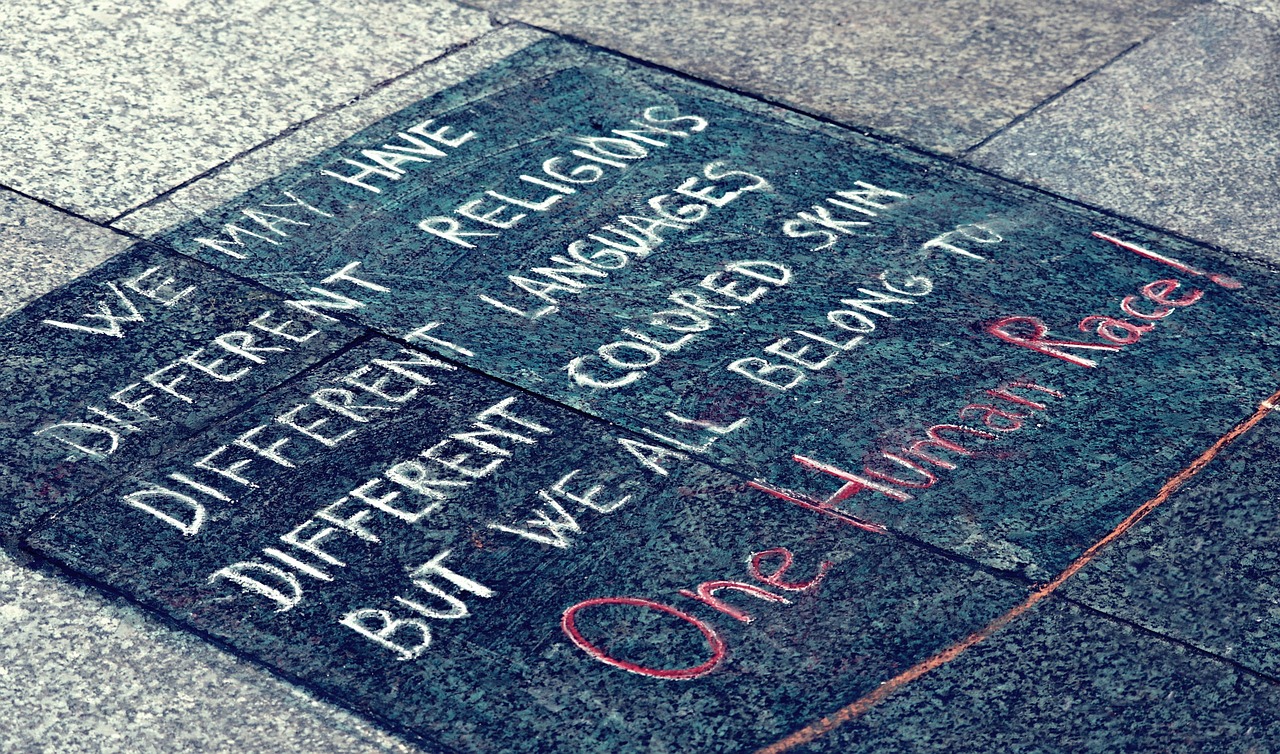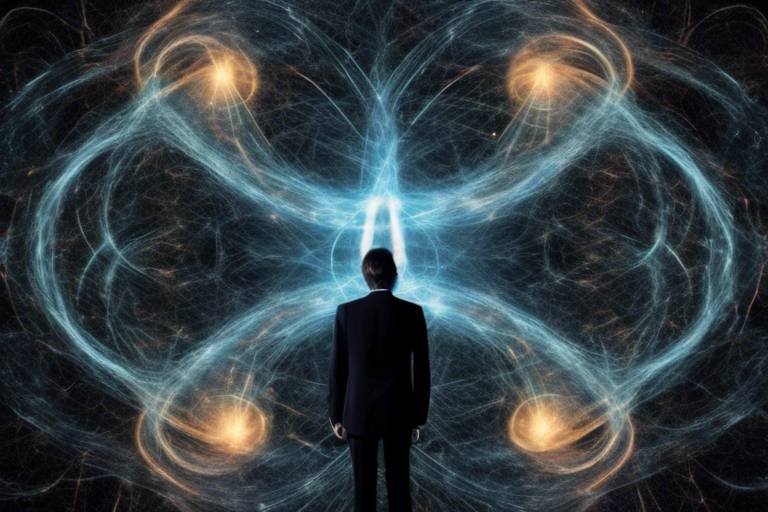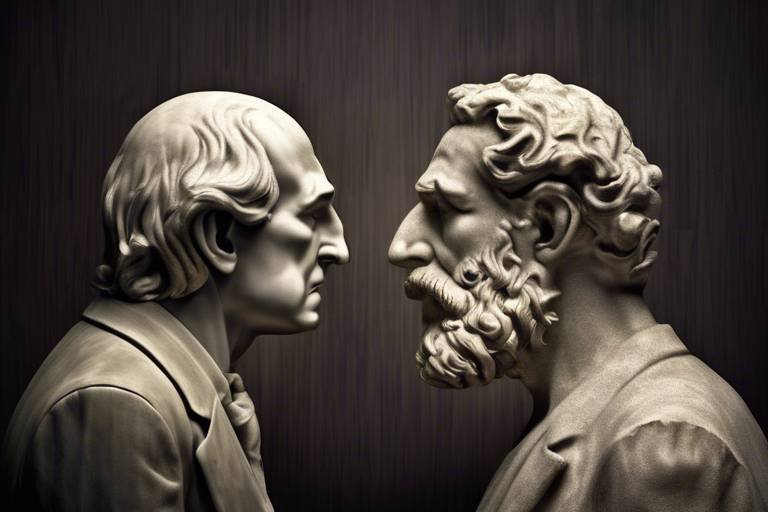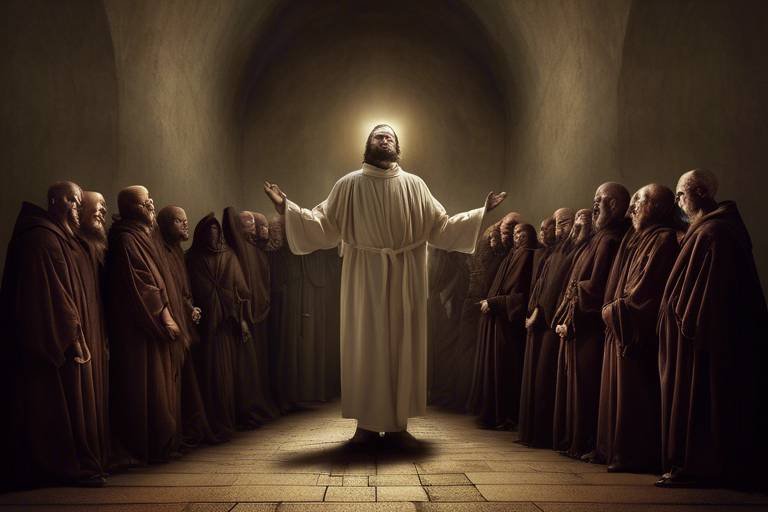Philosophical Implications of Quantum Theory
Quantum theory is not just a collection of mathematical equations; it is a profound lens through which we can examine the very fabric of our existence. It invites us to ponder some of the most fundamental questions about reality, knowledge, and our place in the universe. As we delve into the philosophical implications of quantum mechanics, we encounter a world that is both perplexing and awe-inspiring. Imagine standing on the edge of a cliff, gazing into the vast unknown; that’s what exploring quantum theory feels like. It challenges our intuitions and compels us to reconsider what we believe to be true.
At its core, quantum theory reveals that the universe operates in ways that defy our classical understanding. For instance, particles can exist in multiple states simultaneously, a phenomenon known as superposition. This idea is reminiscent of a spinning coin—while it's in the air, it’s neither heads nor tails but rather a blend of both. When we observe the coin, it "decides" to land on one side. This brings us to the crux of the matter: the act of observation itself plays a pivotal role in determining the state of a quantum system. What does this mean for our understanding of reality? Are we merely passive observers, or do we actively shape the universe around us?
As we navigate through these philosophical waters, we encounter the concept of causality. In the classical world, events follow a clear cause-and-effect chain, much like a row of dominoes falling one after the other. However, quantum mechanics introduces an element of unpredictability that raises profound questions. Is the universe governed by fixed laws, or does it dance to the tune of randomness? This uncertainty forces us to confront our assumptions about determinism and the nature of existence itself. Are our lives scripted by the laws of physics, or do we possess an element of freedom in our choices?
One of the most captivating aspects of quantum theory is the observer effect. When we measure a quantum system, we inadvertently influence its behavior. It’s akin to watching a magician perform a trick; your gaze can alter the outcome. This phenomenon leads us to question the objectivity of knowledge. If our observations can change the state of reality, how can we trust our perceptions? Are we merely interpreting a reality that is inherently subjective? These questions blur the lines between science and philosophy, urging us to explore the very essence of what it means to know.
To further complicate matters, interpretations of quantum mechanics present differing views on reality. The Copenhagen Interpretation posits that quantum particles do not have definite states until they are observed, challenging our traditional understanding of existence. On the other hand, the Many-Worlds Interpretation suggests that every possible outcome of a quantum event actually occurs in separate, branching universes. This raises intriguing questions about choice and existence. If every decision we make spawns a new universe, what does that imply for our sense of agency?
The implications of quantum theory extend beyond mere philosophical musings; they ignite debates between philosophical realism and anti-realism. Realism asserts that an objective reality exists independent of our perceptions, while anti-realism argues that reality is contingent upon our observations. This clash of ideas has significant ramifications for our understanding of knowledge and existence, prompting us to reconsider the very nature of reality itself.
As we venture deeper into the philosophical implications of quantum mechanics, we cannot ignore the concept of free will. The indeterminate nature of quantum events invites us to rethink our notions of choice and agency. If randomness plays a role in the universe, how much control do we truly have over our actions? This question leads us to a crossroads where science and ethics intersect, compelling us to evaluate the moral implications of our decisions.
Furthermore, the randomness inherent in quantum mechanics challenges traditional views of free will, raising ethical questions about responsibility and accountability. If our actions are influenced by unpredictable quantum events, can we still hold individuals accountable for their choices? This dilemma opens a Pandora's box of ethical considerations that society must grapple with as we continue to explore the implications of quantum theory.
- What is quantum theory? Quantum theory is a fundamental theory in physics that describes the physical properties of nature at the scale of atoms and subatomic particles.
- How does quantum theory challenge traditional notions of reality? It suggests that particles can exist in multiple states at once and that observation affects their state, complicating our understanding of existence.
- What are the implications of quantum mechanics on free will? The randomness in quantum events raises questions about our control over actions and the ethical implications of responsibility.
- What are the Copenhagen and Many-Worlds interpretations? The Copenhagen Interpretation posits that particles don't have definite states until observed, while the Many-Worlds Interpretation suggests all possible outcomes occur in separate universes.

The Nature of Reality
Quantum theory is nothing short of a mind-bending journey into the fabric of existence. Imagine a world where particles can exist in multiple states at once, like a magician pulling a rabbit out of a hat, only to reveal that there are actually several rabbits, each one in a different color! This idea of superposition challenges our traditional understanding of reality, where we typically think of objects as having definite properties at any given time. Instead, quantum mechanics suggests that until we take a closer look—through observation—particles are in a state of uncertainty, existing in all possible states simultaneously. It’s as if reality is a vast ocean of possibilities, where only the act of observation pulls a specific wave into focus.
This leads us to ponder: What does it mean for something to be real? If reality is contingent upon observation, does that imply that our understanding of the universe is inherently subjective? The implications are staggering. Consider the famous double-slit experiment, where particles behave like waves when unobserved, but act like particles when observed. This phenomenon not only highlights the role of the observer but also raises questions about the very nature of reality itself. Are we, as observers, merely passive witnesses to a grand cosmic play, or do we wield the power to shape reality with our perceptions?
Furthermore, the concept of quantum entanglement adds another layer of complexity. Imagine two particles that become intertwined in such a way that the state of one instantly influences the state of the other, no matter how far apart they are. This phenomenon seems to defy the classical notion of locality and suggests a deeper interconnectedness in the universe. It’s as if the universe is a vast web, where every thread is connected, and pulling on one can reverberate through the entire fabric of reality.
As we delve deeper into quantum mechanics, we must confront the notion that our understanding of reality may be fundamentally flawed. Are we simply projecting our limited perceptions onto a vast, unknowable universe? Or is there an objective reality that exists independently of our observations? This existential inquiry invites us to challenge our assumptions and consider the possibility that reality is not a fixed entity but rather a dynamic interplay of possibilities waiting to be realized.
In conclusion, the nature of reality, as illuminated by quantum theory, is a complex tapestry woven from uncertainty, observation, and interconnectedness. It beckons us to question not only what is real but also how we come to know it. As we continue to explore these profound questions, we may find that the answers are as elusive as the particles we seek to understand.

Causality and Determinism
When we dive into the world of quantum mechanics, we stumble upon a fascinating conundrum: the relationship between causality and determinism. Traditionally, we’ve viewed the universe as a well-oiled machine, where every action has a corresponding reaction, much like a game of dominoes. You knock one over, and the rest follow in a predictable chain. However, quantum theory throws a wrench into this neat machinery, suggesting that things aren’t as straightforward as we once believed.
The probabilistic nature of quantum events introduces a level of uncertainty that challenges our understanding of how cause and effect operate. Imagine flipping a coin; while you can predict that it will either land heads or tails, the outcome is inherently uncertain until the moment it lands. In the quantum realm, particles behave similarly. They exist in a state of superposition, meaning they can be in multiple states at once until they are measured. This raises a profound question: if particles can exist in multiple states, how can we claim to understand the causal relationships that govern their behavior?
To illustrate this further, consider the famous thought experiment known as Schrödinger's Cat. In this scenario, a cat is placed in a sealed box with a radioactive atom that has a 50% chance of decaying within an hour. Until the box is opened and observed, the cat is considered to be both alive and dead simultaneously. This paradox challenges our conventional understanding of causality, as it suggests that the act of observation itself plays a crucial role in determining the outcome, rather than a fixed cause leading to a specific effect.
As we ponder these implications, we find ourselves at a crossroads between two philosophical viewpoints:
- Determinism: The belief that all events, including moral choices, are determined completely by previously existing causes.
- Indeterminism: The idea that not all events are causally determined, allowing for randomness and unpredictability in the universe.
This debate is not merely academic; it has real-world consequences. If the universe operates on fixed laws, then everything we do is merely a series of predetermined events. But if randomness and uncertainty are fundamental aspects of reality, it opens the door to new interpretations of our actions and decisions. Are we merely spectators in a cosmic play, or do we have a hand in shaping our destinies?
To further complicate matters, the implications of quantum mechanics have sparked discussions about the nature of time itself. In a deterministic framework, time is linear, flowing from past to present to future in a predictable manner. However, the probabilistic nature of quantum events suggests that time might not be as straightforward as we think. Could it be that our perception of time is merely an illusion, shaped by our limited understanding of the cosmos?
Ultimately, the questions raised by quantum theory regarding causality and determinism invite us to reconsider our fundamental beliefs about reality. As we navigate this uncharted territory, we must grapple with the uncertainty that quantum mechanics introduces, challenging us to embrace a more nuanced understanding of the universe and our place within it.

The Role of Observation
In the realm of quantum mechanics, the act of observation is not merely a passive engagement; it is a powerful force that shapes reality itself. This phenomenon, often referred to as the observer effect, reveals that the very act of measuring a quantum system can alter its state. Imagine trying to catch a glimpse of a shy rabbit in the woods. The moment you step closer to observe, it may dart away, changing its behavior entirely. Similarly, in quantum physics, particles exist in a cloud of probabilities until they are observed, at which point they 'choose' a specific state. This raises profound questions about the objectivity of our knowledge and the nature of reality.
To further illustrate this concept, consider the famous double-slit experiment. When particles, like electrons, are fired at a barrier with two slits, they create an interference pattern, suggesting they are behaving like waves. However, when we attempt to observe which slit the particle goes through, the interference pattern disappears, and the particles behave like individual particles instead. This transformation due to observation challenges our traditional understanding of reality, making us reconsider whether what we perceive is truly an objective existence or merely a reflection of our interactions with it.
The implications of the observer effect extend beyond physics into philosophy and epistemology. If our observations can influence the state of reality, can we ever claim to have objective knowledge? Are we, as observers, simply participants in a reality that is co-created through our perceptions? This intertwining of observer and observed suggests that our understanding of the universe is more complex than we ever imagined.
Moreover, the implications of this phenomenon can be summarized in a few key points:
- The act of observation can fundamentally change the state of a quantum system.
- Reality may not exist independently of our observations.
- Our understanding of knowledge is challenged by the subjective nature of observation.
As we delve deeper into the philosophical implications of quantum theory, we find ourselves at the intersection of science and philosophy, where questions about existence, knowledge, and reality converge. The observer effect not only reshapes our understanding of the quantum world but also invites us to reflect on our role as conscious beings in the grand tapestry of the universe.
- What is the observer effect in quantum mechanics?
The observer effect refers to changes that the act of observation can make on a quantum system, influencing its state. - How does the double-slit experiment illustrate the observer effect?
In the double-slit experiment, particles behave like waves until observed, at which point they act like particles, demonstrating the impact of observation. - What are the philosophical implications of the observer effect?
The observer effect challenges our understanding of objective reality and raises questions about the nature of knowledge and existence.

observer effect,
This article explores the profound philosophical questions raised by quantum theory, examining its impact on our understanding of reality, causality, and the nature of knowledge itself.
Quantum theory challenges traditional notions of reality, suggesting that particles exist in superpositions and that observation plays a crucial role in determining their state.
The probabilistic nature of quantum events raises questions about causality and determinism, prompting discussions on whether the universe operates on fixed laws or inherent randomness.
Observation in quantum mechanics leads to the observer effect, where the act of measuring influences the system, questioning the objectivity of knowledge and reality. Imagine you’re peeking into a room filled with mysterious boxes. The moment you open one to see what’s inside, you not only unveil its contents but also change the state of the box itself. This analogy mirrors how observation in quantum mechanics alters the state of particles. When we measure a particle's position or momentum, we inadvertently force it into a specific state, which raises a critical question: can we ever truly know something without affecting it?
This interpretation posits that quantum particles don’t have definite states until observed, challenging our understanding of existence and the nature of reality itself.
In contrast, the Many-Worlds Interpretation suggests that all possible outcomes occur in separate, branching universes, raising questions about the nature of choice and existence.
The implications of quantum theory fuel debates between realism, which asserts an objective reality, and anti-realism, which suggests reality is dependent on observation and perception.
Quantum mechanics invites reconsideration of free will, as the indeterminacy of quantum events may suggest a departure from classical notions of choice and agency.
The inherent randomness in quantum mechanics challenges traditional views of free will, leading to questions about how much control we truly have over our actions.
The implications of quantum theory on free will raise ethical questions about responsibility and accountability in a universe that may not adhere to deterministic principles.
- What is the observer effect? The observer effect refers to changes that the act of observation can make on a phenomenon being observed, particularly in quantum mechanics.
- How does the observer effect relate to reality? It challenges the notion of objective reality, suggesting that reality may be influenced by our observations.
- Does the observer effect imply we can’t know anything for certain? In quantum mechanics, it raises questions about the limits of our knowledge and the influence of our actions on what we observe.

where the act of measuring influences the system, questioning the objectivity of knowledge and reality.
This article explores the profound philosophical questions raised by quantum theory, examining its impact on our understanding of reality, causality, and the nature of knowledge itself.
Quantum theory challenges traditional notions of reality, suggesting that particles exist in superpositions and that observation plays a crucial role in determining their state.
The probabilistic nature of quantum events raises questions about causality and determinism, prompting discussions on whether the universe operates on fixed laws or inherent randomness.
In quantum mechanics, the act of measuring a system significantly influences its state, a phenomenon known as the observer effect. This intriguing concept reveals that the mere act of observation can alter the very nature of what is being observed. Imagine a painter who, while creating a masterpiece, finds that each brushstroke changes the canvas in unforeseen ways. Similarly, when we measure quantum particles, we inadvertently shape their properties, leading to a profound questioning of the objectivity of knowledge and reality itself.
This interpretation posits that quantum particles don’t have definite states until observed, challenging our understanding of existence and the nature of reality itself.
In contrast, the Many-Worlds Interpretation suggests that all possible outcomes occur in separate, branching universes, raising questions about the nature of choice and existence.
The implications of quantum theory fuel debates between realism, which asserts an objective reality, and anti-realism, which suggests reality is dependent on observation and perception.
Quantum mechanics invites reconsideration of free will, as the indeterminacy of quantum events may suggest a departure from classical notions of choice and agency.
The inherent randomness in quantum mechanics challenges traditional views of free will, leading to questions about how much control we truly have over our actions.
The implications of quantum theory on free will raise ethical questions about responsibility and accountability in a universe that may not adhere to deterministic principles.
- What is the observer effect in quantum mechanics?
The observer effect refers to the phenomenon where the act of measuring a quantum system influences its state, suggesting that observation plays a crucial role in determining reality. - How does quantum theory challenge traditional views of reality?
Quantum theory introduces concepts like superposition and entanglement, which defy classical notions of particles having definite states and locations until observed. - What are the implications of quantum mechanics on free will?
The randomness inherent in quantum events raises questions about the nature of choice and whether we have true agency in a probabilistic universe.

The Copenhagen Interpretation
The Copenhagen Interpretation is one of the most widely discussed interpretations of quantum mechanics, proposed primarily by physicists Niels Bohr and Werner Heisenberg in the early 20th century. At its core, this interpretation suggests that quantum particles do not have a definite state until they are observed. This assertion fundamentally challenges our traditional understanding of reality, where objects exist in a specific condition regardless of observation. Instead, the Copenhagen Interpretation posits that reality is somewhat fluid and contingent upon our interaction with it.
Imagine a light switch that is both on and off at the same time until someone walks into the room to check it. This analogy captures the essence of the Copenhagen Interpretation, where the act of observation collapses the wave function of a particle into a single state. Until that moment of observation, the particle exists in a superposition of states—much like our hypothetical light switch. This leads us to ponder: can we ever truly know the state of a particle without influencing it? The implications of this are staggering, as they suggest that our knowledge of the universe is not merely a passive reflection of reality but an active participation in creating it.
Furthermore, the Copenhagen Interpretation raises profound questions about the nature of knowledge itself. If observation alters the state of a quantum system, can we claim to have objective knowledge of that system? It challenges the very foundation of scientific inquiry, where objectivity is paramount. In the realm of quantum mechanics, the line between observer and observed blurs, leading us to question the reliability of our measurements and the nature of reality itself. This interpretation has led to intense debates among physicists and philosophers alike, with some advocating for its acceptance while others seek alternative explanations.
To illustrate the significance of the Copenhagen Interpretation, consider the following table that summarizes its key aspects:
| Aspect | Explanation |
|---|---|
| Wave Function | A mathematical description of the quantum state of a system. |
| Superposition | The ability of a quantum system to be in multiple states at once. |
| Observer Effect | The phenomenon where the act of measuring a system influences its state. |
| Collapse of the Wave Function | The transition from a superposition of states to a single state upon observation. |
In conclusion, the Copenhagen Interpretation not only reshapes our understanding of quantum mechanics but also invites us to reconsider our philosophical stance on reality and knowledge. It opens a Pandora's box of questions: What does it mean to observe? How does our perception shape the universe? These inquiries are not just academic; they touch the very essence of our existence and challenge us to explore the boundaries of human understanding.

Many-Worlds Interpretation
The (MWI) of quantum mechanics is a mind-bending concept that flips our understanding of reality on its head. Imagine a universe where every possible outcome of a quantum event actually occurs, but in separate, branching universes. It's like a cosmic choose-your-own-adventure book where every decision creates a new storyline, leading to an infinite number of realities coexisting alongside our own. This interpretation was first proposed by physicist Hugh Everett III in 1957 and has since sparked intense debate and fascination among scientists and philosophers alike.
At its core, MWI suggests that when a quantum event happens—say, a particle being in one state or another—rather than collapsing into a single outcome upon observation, the universe splits into multiple branches. Each branch represents a different possible outcome, meaning that every time a choice is made, a new universe is created. So, if you’ve ever wondered what life would be like if you took a different path, MWI posits that there’s a universe where that alternative choice was made.
This interpretation challenges our traditional views of reality and existence. It raises profound questions about the nature of choice and agency. If every possible outcome exists in its own universe, what does that say about our ability to make decisions? Are we merely players in an elaborate cosmic play, where every script has already been written? Or do we genuinely exert free will, with each choice creating new realities?
One of the most intriguing aspects of MWI is its implications for the concept of causality. In a universe governed by MWI, the idea of cause and effect becomes more complex. Each action leads not just to one consequence, but to a multitude of them, each unfolding in its own unique universe. This leads to a fascinating paradox: if every outcome exists, can we ever truly say that any single outcome is the result of a specific cause? The boundaries of our understanding of causality are pushed to their limits.
To visualize the Many-Worlds Interpretation, consider the following table that summarizes the key differences between traditional interpretations of quantum mechanics and the Many-Worlds Interpretation:
| Aspect | Traditional Interpretation | Many-Worlds Interpretation |
|---|---|---|
| Outcome of Measurement | Single outcome upon observation | All possible outcomes occur in separate branches |
| Nature of Reality | Objective reality exists | Multiple realities coexist |
| Causality | Linear cause and effect | Complex causality with branching outcomes |
| Free Will | Choices lead to specific outcomes | Choices create new universes |
Critics of the Many-Worlds Interpretation argue that it leads to an unwieldy proliferation of universes, making it difficult to test or falsify. However, supporters find beauty in its simplicity and the elegant way it resolves some of the paradoxes inherent in quantum mechanics. The debate continues, and as we delve deeper into the mysteries of the quantum realm, the Many-Worlds Interpretation remains a compelling lens through which to examine the fabric of reality.
- What is the Many-Worlds Interpretation? It is an interpretation of quantum mechanics that suggests every possible outcome of a quantum event occurs in separate, branching universes.
- Who proposed the Many-Worlds Interpretation? The Many-Worlds Interpretation was first proposed by physicist Hugh Everett III in 1957.
- How does MWI affect our understanding of free will? MWI raises questions about free will by suggesting that every choice creates new realities, leading to the idea that all outcomes exist simultaneously.
- Is the Many-Worlds Interpretation widely accepted? While it has garnered support, it remains controversial and is one of several interpretations of quantum mechanics.

Philosophical Realism vs. Anti-Realism
When we dive into the philosophical implications of quantum theory, we inevitably stumble upon the intriguing debate between philosophical realism and anti-realism. At its core, realism posits that an objective reality exists independent of our perceptions or observations. In contrast, anti-realism suggests that what we perceive is inherently tied to our observations, implying that reality is a construct of our consciousness. This dichotomy raises profound questions about the nature of existence itself: Are we merely observers in a universe that exists regardless of our awareness, or is reality something that comes into being only through our interactions?
To illustrate this philosophical tug-of-war, consider the implications of quantum mechanics. The theory suggests that particles do not have definite properties until they are observed, which seems to lend credence to the anti-realist viewpoint. If observation is a fundamental part of determining the state of a particle, then how can we claim that a reality exists independently of our observation? This leads to a fascinating paradox: can we ever truly know the universe if our knowledge is contingent upon our ability to observe it?
On the other hand, proponents of realism argue that despite the peculiarities of quantum mechanics, there remains a consistent reality that exists outside of our subjective experience. They might assert that the laws of physics, the behavior of particles, and the structure of the universe do not rely on human observation for their existence. This viewpoint often rests on the belief that science, through rigorous experimentation and observation, can uncover truths about the universe that are objective and universal.
Interestingly, this debate isn't just academic; it has real-world implications. For instance, in fields like ethics and law, the stance one takes on realism versus anti-realism can influence how we interpret responsibility and accountability. If one subscribes to anti-realism, they might argue that moral truths are subjective and dependent on cultural or personal perspectives. Conversely, a realist might contend that certain moral truths exist independently of human opinion, shaping our understanding of justice and ethical behavior.
In the realm of quantum theory, this philosophical divide becomes even more pronounced. The Copenhagen Interpretation supports an anti-realist view, suggesting that particles exist in a state of potential until measured. This notion challenges the very fabric of our understanding of reality—if the act of observation shapes existence, how can we claim to have access to an objective truth? On the flip side, the Many-Worlds Interpretation aligns more closely with realism by positing that all possible outcomes occur in separate, branching universes, implying a reality that is vast and multifaceted, yet objective in its existence.
Ultimately, the clash between realism and anti-realism invites us to ponder deeper questions about our own existence and understanding. Are we merely spectators in a grand cosmic play, or do we hold the power to shape reality through our perceptions? As quantum theory continues to evolve, so too will our philosophical inquiries into the nature of existence, knowledge, and the universe itself.
- What is philosophical realism?
Philosophical realism is the belief that an objective reality exists independent of our perceptions or beliefs.
- What is anti-realism?
Anti-realism is the view that reality is dependent on our perceptions and observations, suggesting that what we understand as reality is a construct of our consciousness.
- How does quantum theory relate to realism and anti-realism?
Quantum theory raises questions about the nature of reality, as it suggests that particles do not have definite states until observed, challenging the realist view.
- What are the implications of these philosophical positions?
The implications can affect various fields, including ethics and law, influencing how we interpret responsibility and accountability in relation to objective truths.

Implications for Free Will
The realm of quantum mechanics invites us to reconsider our long-held beliefs about free will. Traditionally, we’ve viewed free will as a cornerstone of human existence, a fundamental aspect that grants us the ability to make choices independent of external influences. However, the indeterminacy inherent in quantum events shakes the very foundation of this belief. Imagine a game of dice where, instead of a fixed outcome, each roll could lead to a multitude of possibilities, some of which may never even be realized. This notion raises profound questions: How much control do we truly have over our actions?
In classical physics, the universe operates like a well-oiled machine, where every action has a reaction governed by deterministic laws. But quantum mechanics introduces a layer of unpredictability. When we consider that particles can exist in multiple states until observed, we start to wonder if our decisions are similarly influenced by a web of probabilities rather than certainties. This is not to suggest that we are mere puppets of fate, but rather that the tapestry of our choices may be woven with threads of randomness.
Furthermore, this randomness doesn’t just challenge our understanding of free will; it also invites a deeper exploration of ethical considerations. If our choices are influenced by quantum uncertainties, what does that mean for accountability? For instance, if someone commits a crime, can we hold them fully responsible if their actions were, in part, shaped by unpredictable quantum events? This line of questioning leads us to a complex intersection of morality and science, where the implications of quantum theory extend beyond the laboratory and into the very fabric of our societal norms.
To illustrate this, consider the following table that summarizes the contrasting views on free will in light of quantum mechanics:
| Perspective | Description |
|---|---|
| Determinism | The belief that all events, including human actions, are determined by previously existing causes. |
| Indeterminism | The idea that not all events are determined, allowing for randomness and unpredictability. |
| Compatibilism | The view that free will and determinism are not mutually exclusive; we can have free will even in a deterministic universe. |
| Quantum Free Will | A belief that the randomness of quantum mechanics allows for genuine choice, suggesting a new dimension to free will. |
As we navigate through these philosophical waters, we must also grapple with the implications of our understanding of agency. If quantum mechanics suggests that our decisions are not entirely ours to command, how do we reconcile this with our experiences of choice? Are we simply observers in a universe that unfolds according to the whims of probability? Or do we still possess a form of agency that allows us to navigate through the chaos of quantum uncertainty?
In conclusion, the implications of quantum mechanics on free will are as perplexing as they are profound. They challenge us to rethink not only our understanding of choice but also the ethical frameworks that govern our lives. As we delve deeper into the mysteries of the universe, we may find that the answers to these questions are as elusive as the particles that dance through the quantum realm.
- What is free will in the context of quantum mechanics? Free will refers to the ability to make choices unimpeded by external factors, but quantum mechanics introduces randomness that complicates this notion.
- How does quantum indeterminacy affect moral responsibility? If our choices are influenced by unpredictable quantum events, it raises questions about our accountability for actions.
- Is there a consensus among philosophers regarding free will and quantum mechanics? No, there are various perspectives, including determinism, indeterminism, and compatibilism, each offering different insights on the relationship between quantum mechanics and free will.

Randomness and Choice
When we dive into the depths of quantum mechanics, one of the most intriguing aspects that emerges is the notion of randomness. Unlike the predictable laws of classical physics, quantum events often appear to be governed by chance. This leads us to ponder a critical question: if the universe is inherently random at its core, what does that mean for our understanding of choice? Are our decisions truly our own, or are they merely the result of a cosmic roll of the dice?
Imagine for a moment that our choices are like a game of poker. Each hand we are dealt is influenced by a mix of skill and luck. In the quantum realm, the cards are shuffled in ways that are beyond our comprehension, and the outcomes can seem arbitrary. This randomness challenges the traditional view of free will, which posits that we are the architects of our destiny, making choices based on rational thought and past experiences. Instead, quantum mechanics suggests that some of our choices may be influenced by factors that are utterly unpredictable.
To illustrate this point, consider the following analogy: if life were a movie, classical physics would have us believe that the script is set in stone, with each scene unfolding as planned. However, quantum mechanics introduces a twist—what if the script changes every time someone watches it? In this scenario, our perception and the act of making choices could be akin to pressing the pause button, allowing us to see multiple potential outcomes. Yet, the underlying randomness means that even the choices we think we are making could be influenced by unseen forces.
Furthermore, this randomness leads to profound ethical implications. If our choices are not entirely ours but are influenced by quantum indeterminacy, how do we assign responsibility for our actions? The idea that our decisions could be shaped by random quantum events raises significant questions about accountability. Are we to be held responsible for choices that may not be entirely within our control? This dilemma forces us to reconsider the foundations of morality and ethics in a world where randomness plays a crucial role.
In conclusion, the interplay between randomness and choice in quantum mechanics is a fascinating topic that invites us to rethink our understanding of free will. While the traditional view of choice emphasizes agency and control, quantum theory introduces an element of unpredictability that complicates this narrative. As we continue to explore the philosophical implications of quantum mechanics, we are left with more questions than answers, challenging us to delve deeper into the mysteries of existence.
- What is the observer effect in quantum mechanics?
The observer effect refers to changes that the act of observation can make on a quantum system, indicating that measuring a system can affect its state. - How does quantum theory challenge traditional views of reality?
Quantum theory suggests that particles do not have definite states until they are observed, which challenges the idea of an objective reality existing independently of observation. - What are the ethical implications of randomness in decision-making?
If our choices are influenced by random quantum events, it raises questions about moral responsibility and accountability for our actions.

Ethical Considerations
The implications of quantum theory on our understanding of free will are not just academic; they dive deep into the ethical realm, raising questions that challenge our very notions of responsibility and accountability. Imagine a world where our choices are not entirely our own, but rather influenced by the unpredictable nature of quantum events. This leads us to ponder: if our decisions are partly shaped by randomness, can we truly be held accountable for our actions? It’s a perplexing thought that can make one feel like a puppet on strings, with the quantum universe pulling the strings in ways we might not fully comprehend.
Consider the ethical ramifications of such a viewpoint. If we accept that quantum indeterminacy plays a role in our decision-making processes, we might need to rethink our legal and moral frameworks. For instance, should a person be punished for a crime if their actions were influenced by quantum randomness? It opens a Pandora's box of questions that could redefine justice. To illustrate, let’s break down some key ethical considerations:
- Accountability: If our choices are influenced by quantum mechanics, how do we determine personal responsibility?
- Justice System: Should the legal system adapt to account for the randomness inherent in human behavior?
- Moral Responsibility: Can we maintain the concept of moral responsibility in a world where free will is questioned?
Furthermore, the ethical implications extend beyond individual accountability. They also touch on societal norms and how we perceive and enforce laws. If quantum theory suggests that our actions are influenced by factors beyond our control, this could lead to a more compassionate approach to justice, one that considers the complexities of human behavior rather than strictly adhering to punitive measures. It’s like viewing the world through a kaleidoscope; each twist reveals a new perspective on morality and ethics.
As we navigate these uncharted waters, it’s essential to engage in discussions that challenge our traditional views. Philosophers, scientists, and ethicists need to collaborate, exploring the intersections of quantum mechanics and moral philosophy. The dialogue must continue, as we strive to understand not just the mechanics of the universe, but also the implications of these mechanics on our lives and our society.
Ultimately, the ethical considerations stemming from quantum theory invite us to reflect on our values and beliefs. They encourage us to ask difficult questions about the nature of existence, choice, and accountability. As we delve deeper into the mysteries of quantum mechanics, we must also be willing to confront the ethical dilemmas that arise, ensuring that our understanding of reality is not just scientifically sound but also morally grounded.
- What is the relationship between quantum mechanics and free will? Quantum mechanics introduces elements of randomness that challenge traditional notions of free will, suggesting that not all choices are entirely under our control.
- How does quantum theory affect our understanding of morality? The implications of quantum theory may lead to a reevaluation of moral responsibility, as it raises questions about how much control we truly have over our actions.
- Can we hold people accountable for their actions in a quantum universe? This is a complex issue; if our choices are influenced by quantum randomness, it complicates the traditional views of accountability and justice.
Frequently Asked Questions
- What is the significance of quantum theory in understanding reality?
Quantum theory fundamentally challenges our traditional views of reality. It introduces the idea that particles can exist in multiple states simultaneously, known as superposition, and that the act of observation influences their state. This leads us to question what we perceive as real and how much our perceptions shape our understanding of the universe.
- How does quantum theory challenge the concept of causality?
The probabilistic nature of quantum events suggests that not everything in the universe operates under fixed laws. This raises intriguing questions about determinism versus randomness, prompting us to rethink whether every event is a direct result of preceding causes or if some events occur without a clear cause.
- What is the observer effect in quantum mechanics?
The observer effect refers to the phenomenon where the act of measuring a quantum system affects its state. This challenges the objectivity of knowledge, as it implies that reality may not be independent of our observations. It raises philosophical questions about whether we can ever truly know the state of a system without influencing it.
- Can you explain the Copenhagen Interpretation?
The Copenhagen Interpretation suggests that quantum particles do not have definite states until they are observed. This interpretation challenges our understanding of existence itself, as it implies that reality is not fixed but rather contingent upon observation, which can be quite mind-bending!
- What is the Many-Worlds Interpretation?
The Many-Worlds Interpretation posits that all possible outcomes of quantum events occur in separate, branching universes. This concept raises fascinating questions about choice and existence, suggesting that every decision we make might create an alternate reality where different outcomes unfold.
- How does quantum theory impact the debate between realism and anti-realism?
The implications of quantum theory fuel ongoing debates between realism, which asserts that an objective reality exists independent of our perceptions, and anti-realism, which argues that reality is shaped by observation. This philosophical discourse is vital for understanding the nature of existence and our place within it.
- What are the implications of quantum mechanics for free will?
Quantum mechanics invites us to reconsider our understanding of free will. The inherent randomness in quantum events suggests that not everything is predetermined, which challenges classical views of choice and agency. This raises profound questions about how much control we truly have over our actions.
- What ethical considerations arise from quantum theory's implications for free will?
The implications of quantum theory on free will lead to ethical questions about responsibility and accountability. If our choices are influenced by random quantum events, what does that mean for moral responsibility? This conundrum invites deeper reflections on how we view ethics in a potentially non-deterministic universe.



















